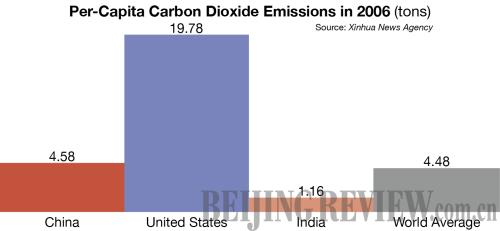|
 |
|
LOW-CARBON WEDDING: A young couple in Nanjing, capital of east Jiangsu Province, rides bicycles to their wedding ceremony (WANG YUEWU) |
Standing in the way of the country's green drive are local governments that are pushing for energy-depleting and highly polluting industries in a blind pursuit of faster GDP growth, he added.
Profitable prospects
After experiencing a deep economic downturn, the corporate world is realizing that going green is not an option but a basic necessity if they wish to thrive in the future. By either improving their energy efficiency or restructuring corporate management, businesses are embarking on different routes to a more sustainable carbon-constrained growth model.
Meanwhile, stimulus for the green economy and growing customer interest have provided firms with the opportunity to reap profits and expand green technology development. Evidence is in the burgeoning solar panel industry that received a heavy boost from government incentives, including tax breaks and cash subsidies. The Jiangsu Province-based Suntech Power Holdings Co. Ltd., the world's largest crystalline silicon photovoltaic module manufacturer, announced construction of its first U.S. manufacturing facility in Arizona, aiming to grab 20 percent of the American market.
Companies are producers, but they also play market-altering roles as major buyers with the power to direct their purchasing power toward more climate-friendly products. The corporate responsibility message is now widely accepted by most leading companies, not only because they are aware of the repercussions from customers if they do not appear to be making substantial green efforts, but also because it is profitable, said a recent United Nations Environment Program report.
Corporations can also exert influence over their employees by providing incentives for using public transportation to commute to and from work among other alternatives, the report added.
Instead of using central air conditioning, the Zhejiang Xinfengmin Chemical Fiber Co. Ltd., pumped well water to the roof of its plants, providing a natural, energy-efficient way of cooling its facilities in the summer. In another move, Beijing Air Catering Ltd., the first joint venture company in China, requires its suppliers to provide healthy and environmentally-friendly materials, and also lined up a green food production base in the Ningxia Hui Autonomous Region in northwest China in an effort to curb its carbon footprint along the supply chain. More over, the air caterer is containing emissions by utilizing video conferencing to avoid business travel.
"It pays for the corporate world to go green," Annie Wu, founding President of Beijing Air Catering Ltd., told Beijing Review. But given its far-reaching implications, it is well worth the effort, she said.
In August 2008, the Shanghai-head-quartered Tianping Auto Insurance Co. Ltd. became the first Chinese corporate volunteer to purchase carbon offsets. The insurance company paid nearly 280,000 yuan ($40,966) as compensation for its emissions during 2004 and 2008.
The move marked a great leap in climate change awareness among Chinese companies that are beginning to hold true to their environmental pledges, said Ma Aimin, an environmental expert with the National Development and Reform Commission.
Reduce, reuse, recycle
One of the major obstacles on China's carbon-free path is how the country can minimize pollution created from the abundant use of coal to fuel its industries—a problem that will require more than a quick fix.
The experience of Inner Mongolia Autonomous Region-based Huaneng Yimin Coal and Power Co. Ltd. could provide a framework for the rest of the country to work around.
Integrating both coal mining and power generation allows the company to save on transportation costs and secure a stable supply of resources. The ashes left over from coal burning are used to make bricks and other construction materials, while wastewater is purified for re-circulation. In addition, coal is required to go through desulphurization before burning for power generation to protect the environment and minimize erosion of the company's metal equipment.
"The cyclical business model is a big enhancement to our operational efficiency and cost controls, giving us a sharp competitive edge," said Yin Long, general manager of the company. "The advanced circulation facilities could conserve around 11 million tons of water annually, a remarkable turn of events given the acute drought in Inner Mongolia."
In 2008 when the whole sector spilled red ink due to coal shortages, the company reported a juicy profit of 867 million yuan ($127 million) due to its environmental efforts, added Yin.

| 